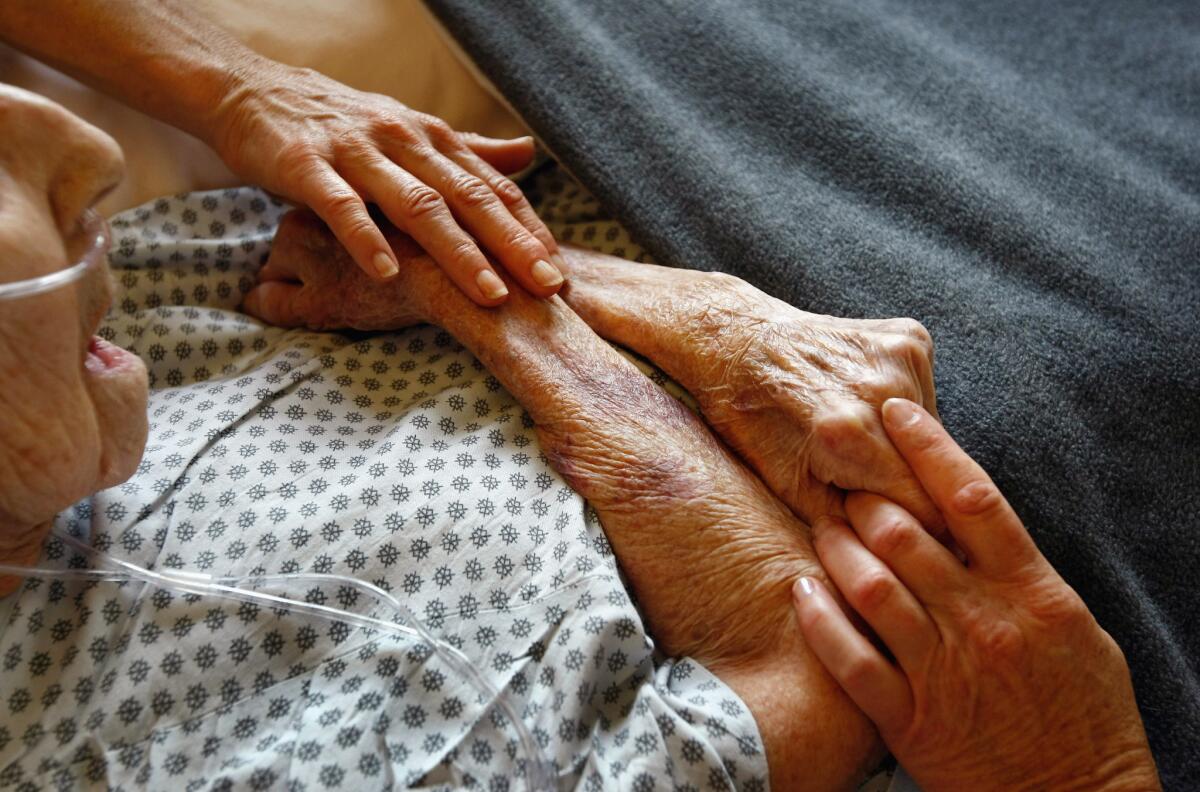Letters to the Editor: Only in America — ‘instead of dying at home, we may die homeless’

To the editor: My wife, after several years of decline into dementia, is now in residential care. I am 82 and lack the physical strength to care for my wife. She is otherwise healthy, and I face perhaps years of paying about $120,000 annually for her care. (“Think you want to die at home? You might want to think twice about that,” Opinion, Feb. 16)
We saved, invested and have a portfolio. Problem is, as I draw upon these funds, I pay taxes on them, so I need to draw $162,000. When that money’s gone, what am I supposed to do?
The issues Dr. Nathan Gray raised are not being addressed by the candidates running for president. We need an improved healthcare system coupled with new tax laws that recognize the costs of extended care and provides relief.
I have enough to pay for my wife’s care for a period of time. Since I must at some point tap into home equity, there is the real chance that instead of dying at home, we may die homeless.
David Strauss, Arcadia
..
To the editor: Dr. Nathan Gray is to be applauded for his dedication to his patients (including the humane practice of making home visits) and his timely warning of the medical challenges posed by the “silver tsunami.”
But I think he gives short shrift to hospice care — at least the hospice care in which I have been involved for 40 years. The practices I have known all provided far more than “expertise, equipment and help with symptoms.”
Yes, hospice is a medical program, but its support involves a far deeper reality than the mere technical one he describes. Hospice workers can provide a wealth of support services, and the good ones do routinely, despite the growing “corporatization” of hospice in recent years.
In my long experience, when a patient and family are supported by a professional, dedicated and compassionate team, their experience, while it may first appear as the “brutal reality” Gray describes, is often transformed by the loving support a properly conducted hospice provides.
Dick Lumaghi, Potter Valley, Calif.
..
To the editor: Thank you for your graphic op-ed article on home medical care, especially for patients at the end of life.
As a house-call physician who also provides palliative and hospice care, I believe we can do better. Utilizing technology in the future will enhance care by assisting with communication between professionals and the families tending to their loved ones at home. Scientific advancements are at our doorstep, with creative ideas formulating a new foundation for home care.
Will our country be a leader in this technology, or will other countries take control and teach us how to better serve these patients and the families who are battling this problem?
Gene Uzawa Dorio, M.D., Santa Clarita
..
To the editor: Having cared for my dying mother at home for the two years leading up to her death, I remember her medical providers trying to foist all sorts of procedures onto me as her caregiver, from directing me to change dressings on semi-permanent fluid draining needles to physically manipulating tissue.
I had to resist these directives since I had absolutely no medical training. Finally, I convinced the hospice doctors and nurses that was their job. Additionally, I once found myself screaming at the supervisor of the for-profit hospice who said my mother was abusing hospice and should have died a long time ago.
I was glad to be there for my mother in her final days, but I cannot deny the physical, emotional and financial toll that experience took on me as she died at home.
Donald Bentley, La Puente
More to Read
A cure for the common opinion
Get thought-provoking perspectives with our weekly newsletter.
You may occasionally receive promotional content from the Los Angeles Times.










